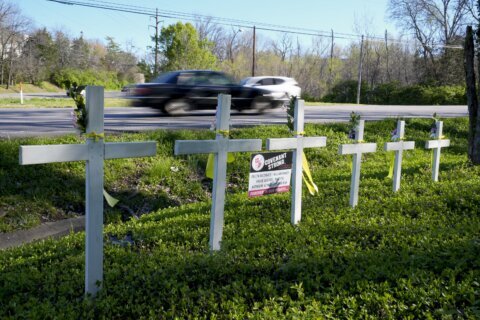Excerpts from recent editorials in the United States and abroad:
___
March 10
The Virginian Pilot & Daily Press on marking one year since the World Health Organization announced that COVID-19 was a global pandemic:
Where were you when the world stopped? It’s a grim question, one with answers unique to every individual who has endured a year of living in the pandemic.
For some, it was the early reporting from China about a new virus strain that first sounded alarm bells. For others, the first confirmed cases, including those in Virginia, served as the wake-up call that the disease was a real and immediate threat.
But on March 11 last year, everything changed.
That day, the head of the World Health Organization announced that COVID-19 was a global pandemic. Dr. Anthony Fauci, a household name now if he wasn’t then, told Congress in a high-profile hearing that the coronavirus would get much worse than the 600 cases confirmed at the time. Sporting events across the country suspended play.
Be it that WHO declaration, Fauci’s ominous warning, the sight of empty basketball courts or even actor Tom Hanks’ announcement that he had contracted the virus, everyone has a moment they remember when the seriousness of the situation was unmistakable.
Into the unknown we plunged. Social distancing and hand washing were encouraged, followed by limitations on gatherings and travel. Masks were mandated. Schools were closed. Restaurants and business were restricted.
The worst was yet to come, as we now know. COVID-19 has claimed more than 526,000 American lives, including more than 9,700 in Virginia. More than 2.6 million are dead worldwide, the global landscape changed by this pathogen.
Many more were sickened, some seriously and some permanently, by the coronavirus. But there is no one left untouched by what’s happened in the last year.
… The frontline health care workers who performed heroic work in the face of that horror will be forever shaped by the experience. We owe each of them so much for their courage and will never be able to repay that debt.
Bravery wasn’t confined to the area’s hospitals and clinics. From grocery store clerks and delivery drivers, to essential manufacturers, food workers and mail carriers, there are so many people — our family, friends and neighbors — who stepped forward when the circumstances demanded it.
Much was made of the disinformation artists and conspiracy theorists — those who proudly proclaimed, in the face of all evidence, that COVID-19 wasn’t worse than the flu — but the fact is those charlatans were vastly outnumbered by area residents who honored the guidelines, did what was asked and reached out to help others.
That spirit of common purpose — of compassion and resolve — gave us hope when we needed it and strength to carry on when things looked their worst. If there is something to take from this awful experience, it should be that.
There is still a tremendous amount of grief and pain and loss that permeates our region today. There are empty chairs at too many dinner tables, empty desks in too many offices and empty pews in too many churches. That anguish will linger.
The world changed abruptly and dramatically a year ago. Few of us were prepared for what unfolded, and there is much we would do differently if given another chance. But we shouldn’t need a deadly disease to show our gratitude to those who serve, or to be helpful and kind toward one another.
We should strive to be more compassionate toward others, to help when and how we can and to try to build tighter and more connected communities — to know our neighbors and give them strength, understanding they will be there when we need some for ourselves.
Online: https://www.pilotonline.com
___
March 10
The Los Angeles Times on the renewed influx of migrant children across U.S.-Mexico border:
President Biden is facing a critical test as a surge of migrants, emboldened by the end of the Trump era, is arriving at the U.S.-Mexico border in hopes of forging better lives here in the U.S. One challenge in particular is the sharp increase in unaccompanied minors.
Federal agents encountered 5,871 unaccompanied minors at the border in January, up from 3,076 in January 2020. How Biden handles this surge could become a defining moment in his administration.
We’ve been here before. In fact, the federal government has been wrestling with this deeply complex problem for years. During the Obama administration an influx of unaccompanied minors, who under law (and basic humanity) require different handling than work-seeking adults, overwhelmed the system, leading the government to hold children in border stations and detention centers as officials struggled to find places for them to live while their cases proceeded through the immigration courts. There’s a library of studies by child psychologists about how damaging such detentions are to children.
Then came the Trump administration, whose answers included claiming a health emergency and directing border agents to turn children and adults around rather than letting them pursue their legal right to seek permission to enter and stay.
Biden has pledged a more compassionate approach, but he has also warned that undoing the harsh Trump policies will take more than a few strokes of a pen. The administration reportedly is turning a newly reopened children’s detention center in Texas into a processing center to help border agents meet their legal obligation to turn over unaccompanied minors within 72 hours to the Department of Health and Human Services, which then has 20 days to place them in safe and secure homes while their cases are processed — deadlines the government routinely misses.
We welcome Biden’s more humane approach, but wonder whether it will succeed in the face of the rising tide of juveniles arriving without parents or guardians. Once again the nation is watching its government strain to meet obligations Congress imposed to treat unaccompanied minors with the delicacy they deserve. Once again we see a growing crisis spotlight the broad inadequacies of the government’s immigration enforcement system to deal compassionately with human migration.
The solutions require broad vision and actions, including efforts to reduce the instability in Central American countries that send so many people fleeing in the first place. Such efforts, of course, run into a headwind of deep-rooted corruption in some of those countries.
But the longer the government leaves those broad solutions unfulfilled, the more it will be forced to deal with waves of migration, one crisis following another. We need a better way of doing this.
Online: https://www.latimes.com
____
March 10
The Buffalo News on the impact of the child allowance in President Joe Biden’s stimulus package:
Unlike government programs that create a large bureaucratic structure to administer them, the child allowance that is part of President Biden’s $1.9 stimulus plan has a simple premise: It will send checks directly to families. With that, the administration hopes to put a big dent in the nation’s rate of child poverty.
The program is approved for just one year, but Democratic lawmakers hope it catches on and they can extend it. The full impact will not be fully evident after 12 months, but in a city like Buffalo — which in 2019 had the nation’s second-highest childhood poverty rate — the effects should be profound.
Under the legislation, families will receive up to $3,600 annually for each child under age 6 and as much as $3,000 for those up to 17. The payments start to phase out for individual parents earning more than $75,000 and couples making $150,000.
In addition to helping families escape the indignities of deprivation, putting spending money into households here could result in businesses such as grocers, banks and retail stores following the money and moving into previously underserved neighborhoods.
Estimates for the cost of the plan range from $110 billion to $120 billion, or around 6% of the total stimulus package. That money is an investment with the potential for a very handsome return, and not just for the lower- and middle-class families getting a hand up.
The National Academy of Sciences estimates that childhood poverty costs the United States between $800 billion and $1.1 trillion annually. Limited lifetime earnings and more health problems, homelessness and child neglect are among the factors.
According to the Center on Poverty and Social Policy at Columbia University, the legislation will reduce the number of children living in poverty by 45%, slashing the childhood poverty rate for the year to less than 7%.
Helping families survive times of need, particularly after a full year of a pandemic, will enable more parents to join the workforce. Despite fears from conservative opponents that the child allowance will discourage adults from wanting to work, there is evidence to the contrary.
Jane Waldfogel, a Columbia University professor, told The New York Times that a family benefits program started by British Prime Minister Tony Blair in 1999 led to increased employment among single mothers. With his plan, Britain’s childhood poverty rate was eventually cut in half.
The pandemic caused many parents, in many cases women, to leave their jobs to care for family members. Many will use their federal payments to be able to afford child care, better transportation options and other basics that allow them to return to work. The family payments are not enough to live on by themselves.
Other rich countries, including Canada, Denmark, Finland, Norway and Sweden, also give families cash payments to subsidize the costs of raising children.
Poverty and many of its side effects — susceptibility to drug addiction and crime, food insecurity — do not stop at the city limits. Residents of rural towns face many of the same issues and will receive the same income boost to help keep their families going. And the size of the check isn’t affected by who you voted for in November.
Most parents want a hand up more than a handout. There is dignity in being able to hold a job and put food on the table rather than relying on food banks or free school lunches, as important as those are. Biden’s anti-poverty program will allow more parents to enter or remain in the workforce, helping our region’s economy to get back on its feet after the beating it has taken from Covid-19.
Online: https://buffalonews.com
___
March 8
The San Antonio Express-News on the announcement of a partnership between pharmaceutical companies that is expected to speed up the vaccine effort:
Good news is always welcome, but unexpected good news in the fight against COVID-19 is even sweeter. During this past year as COVID-19 held the United States and the rest of the world hostage, good news has been scarce and usually centered around the development, rollout and distribution of vaccines — but even this bright spot has been exceedingly frustrating.
The unexpected good news delivered by President Joe Biden last week was the historic partnership between pharmaceutical companies Merck and Johnson & Johnson to manufacture the latter’s COVID-19 vaccine. This will help make it possible to have enough shots for every adult in the country by the end of May. The Biden administration previously set this goal for the end of July.
Hurdles may still remain in terms of distribution and vaccine hesitancy, but it’s welcome news to see two rivals working together in our fight against COVID, and this agreement could prove particularly important in the second half of the year as new variants emerge and booster shots may be required.
The announcement, coming as the new one-dose vaccine is being rolled out, is the culmination of the administration’s direct involvement. When Johnson & Johnson announced it would be able to provide little more than half of the doses it had contracted to deliver by the end of March, the administration negotiated with the company, convincing it to make a number of production changes to accelerate the timeline and enlisting Merck to help.
Biden also announced he would invoke the Defense Production Act, the Korean War-era law that gives the government the authority to, among other things, issue loans and provide funding to expand a vendor’s capacity and to prioritize the government’s order before those of other clients. This allows the government to provide Johnson & Johnson with the supplies necessary to make the vaccine while also assisting Merck in retrofitting a manufacturing plant that will be used for production.
This partnership and escalated timetable for vaccinations illustrate how leadership and competence can make government work for the good of everyone. But vaccines are only part of the fight against COVID-19.
Biden has also told the American people that despite the good news, we must continue wearing masks, social distancing and following public health guidelines. We’ll see if that continues in Texas now that Gov. Greg Abbott has rescinded the state’s mask mandate.
Online: https://www.expressnews.com
___
March 8
The Guardian on Harry and Meghan’s televised interview with Oprah:
Of royalty, Walter Bagehot wrote in The English Constitution, “we must not let in daylight upon the magic”. To preserve the charm and mystery of the monarchy required its workings to be shielded from the public. In lifting the veil, Prince Harry has spoken of a dysfunctional palace, where more than a whiff of racism lurked and suicidal anguish was dismissed. The interview that the Queen’s grandson and his wife, the Duchess of Sussex, gave to their friend Oprah Winfrey painted a picture of a Britain under a thin aristocratic crust that was wreathed in a “toxic atmosphere” in which the Windsors were either willingly or unwillingly trapped. Royal life, the couple said, was stalked by the fear of the tabloid press. These charges cannot be treated lightly. Prince Harry is the ultimate palace insider, with a ringside seat at the royal circus for decades.
The monarchy’s soft power rests upon the great social – and political – pressure not to embarrass the Queen. The royal family has been obliged to protect her interests and shield her from criticism, aware that their fortunes are tied to preserving the monarchy’s hold over people. Prince Harry has broken this rule, and he seems to care little that he has done so. Like his mother, Diana, Princess of Wales, he outmanoeuvred the palace because he was willing to bare his soul in public. Princess Diana’s fury with her husband and his betrayals did not threaten “the firm” until she died. The prince has fired a missile from California at the heart of the establishment while very much alive.
This is no accident. In speaking to Ms Winfrey, whose secular authority is greater than any US politician, the Duke and Duchess of Sussex are signalling that the English-speaking world now has two royal households to choose from and identify with. One appears to trade in the politics of emotion, feeling people’s pain just as they felt theirs. The other, if one accepts the Sussexes account, is flawed and cruel – and unable to cope with mental suffering.
The rule that embarrassment to the Queen should be avoided at all costs only applies if you wish to play the game. The Sussexes have been financially cut off by the royal family. In telling their side of the story they have boosted their global celebrity, and almost certainly their popularity, on which their income depends. Media deals have reportedly made them multimillionaires. They were frozen out after the palace decided that one could not represent the Queen at public engagements while making money from such self-promoting business activities.
Yet l’affaire Sussex is more than about money. In the UK, the monarch has the final power of decision and retains that right because they refrain from political manoeuvring. Even if this were true – and given this paper’s revelations about Queen’s consent suggest it is not – the monarch’s desire to be above the fray today looks like royal disdain for social movements such as Black Lives Matter and #MeToo that the Duchess of Sussex has promoted.
The Sussexes have vividly dramatised the real challenge of staying out of politics for the monarchy. A grouse-shooting, landowning ruling caste is likely to support certain political ideas, but to ensure its popularity it remains silent on the big issues. What the Sussexes show is that being relatable and relevant as royals was impossible because it would come into conflict with the monarchy’s very real powers. Whether a hereditary head of state is required today ought to be considered in a programme of reform that the British state clearly – and urgently – needs.
Online: https://www.theguardian.com/
___
March 8
The Las Vegas Review-Journal on a court ruling about campus speech restrictions:
The dubious principles behind campus speech restrictions have rapidly proliferated outside the university in recent times as part of the new fashionable woke authoritarianism. Ironically, such limits on free expression may soon be eradicated on campus even as they further infest American culture at large.
On Monday, the U.S. Supreme Court issued a ruling in a Georgia case that potentially grants standing to thousands of college students to challenge the constitutionality of campus speech rules. That, in turn, could force universities to rethink such policies or risk an increasing number of lawsuits and additional financial liability.
The case involved Chike Uzuegbunam, who in 2016 was a student at Georgia Gwinnett College when school officials designated two small locations as “free speech expression areas.” The designated spots — which amounted to less than two-tenths of 1 percent of the school’s total property, his lawyers calculated — were available “only on weekdays and only for four hours on most days and two on Fridays,” The New York Times reported. “Students could reserve them once every 30 days.”
Mr. Uzuegbunam sought to secure one of the locations to preach to students about his evangelical faith. But … wait for it … some students complained about even this minor concession to the First Amendment, and the police eventually told him he was allowed only to hand out literature or talk to others one-on-one. As the Times put it, “Public speaking in a free speech zone, the officer said, amounted to disorderly conduct.”
You can’t make this stuff up.
Mr. Uzuegbunam sued. The college gave a half-hearted defense of its hostility to the Bill of Rights, actually arguing, according to the Times, that promoting Christianity on campus could violate the “fighting words” doctrine. But the school eventually relented and dropped the policy, arguing that this made the student’s lawsuit moot. A federal appeals court agreed, but the Supreme Court held that even a request for nominal damages in a case involving a core constitutional right is enough to allow the controversy to be adjudicated as long as the plaintiff meets a handful of other conditions.
“That should have colleges and universities very, very worried — and might be the first real set of consequences for academia after decades of forcing speech codes and silence on their students,” noted blogger Ed Morrissey on hotair.com. “Just the added risk of ending up in federal court might be enough of an incentive to force these universities and colleges to recalculate risk and reward.”
The practical effect of Monday’s ruling will be to bolster the First Amendment and other constitutional protections. Let’s hope that becomes a pattern as the justices roll out more decisions before recessing in June.
Online: https://www.reviewjournal.com
Copyright © 2024 The Associated Press. All rights reserved. This material may not be published, broadcast, written or redistributed.







